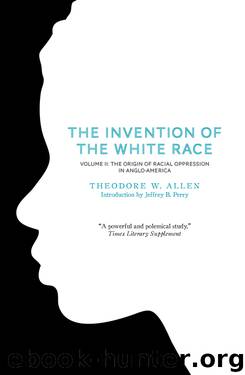The Invention of the White Race, Volume 2: The Origin of Racial Oppression in Anglo-America by Theodore W. Allen & Jeffrey B. Perry

Author:Theodore W. Allen & Jeffrey B. Perry [Allen, Theodore W. & Perry, Jeffrey B.]
Language: eng
Format: epub
Tags: History, Americas, United States, Civil War, Abolition, Politics & Social Sciences, Social Sciences, Specific Demographics, Minority Studies, Sociology, Race Relations, Discrimination & Racism, Special Groups
ISBN: 9781844678440
Amazon: B00I75F9X8
Publisher: Verso
Published: 2014-06-03T05:00:00+00:00
13
The Invention of the White Race – and the Ordeal of America
What Virginia’s laboring-class people, free and bond, were fighting for in Bacon’s Rebellion was not the overthrow of capitalism as such, but an end to the version of that system imposed by the plantation elite, based on chattel bond-servitude and engrossment of the land. Their idea regarding a proper social order was about the same as that which would be expressed by Edmund Burke some eighty years later: “the security … of every nation consists principally in the number of low and middling men of a free condition, and that beautiful gradation from the highest to the lowest, where the transitions all the way are almost imperceptible.”1 If they had succeeded, the outcome of their struggle would have improved opportunities for social mobility within the colony. For the bond-laborers that would have meant an end to unpaid bond-servitude; for them and for the landless freemen, victory would have meant improved opportunity to become independent farmers. Most emphatically, they were not content to be “Tenants to the first Ingrossers, … to be a Tennant on a Continent.”2
However, just as the overthrow of the tenantry in the 1620s had cleared the ground for the institution of chattel bond-servitude, so the defeat of Bacon’s Rebellion cleared the way for the establishment of the system of lifetime hereditary chattel bond-servitude. The relative position of the plantation elite became more dominant than ever not only because of the continuation of their large landholdings, but also because of their advantage in bidding for lifetime bond-labor.
Virginia’s mystic transition from the era of “the volatile society,” most dramatically represented in Bacon’s Rebellion, to “the Golden Age of the Chesapeake” in the middle quarters of the eighteenth century is a much-studied phenomenon. It was during that period that the ruling plantocracy replaced “the ould foundation” that Governor Notley had warned them of, in order to “build their proceedings” on a new one. Central to this political process was, as John C. Rainbolt described it, “The Alteration in the Relationship between Leadership and Constituents in Virginia, 1660–1720.”
In no other period or province did the relationship between rulers and ruled and the role of government alter so markedly as in Virginia between the departure of Governor William Berkeley in 1676 and the administration of Alexander Spotswood from 1710 to 1722.3
The “art of ruling” so manifestly deficient during Bacon’s Rebellion was retrieved; the ruling planter elite had learned “to improvise a style of leadership appropriate to the peculiar weakness of authority and the undisciplined and frustrated citizenry of Virginia.”4
Edmund S. Morgan discusses the transition in a succession of chapters beginning “Toward” – “Toward Slavery,” “Toward Racism,” “Toward Populism,” “Toward the Republic” – and concludes that the subordination of class by “race” at the beginning of the eighteenth century is the key to the emergence of the republic at the end of it.5 Commentary directed specifically to the relationship of “race” and “class” is particularly relevant to the subject of the invention of the white race.
Download
This site does not store any files on its server. We only index and link to content provided by other sites. Please contact the content providers to delete copyright contents if any and email us, we'll remove relevant links or contents immediately.
| Africa | Americas |
| Arctic & Antarctica | Asia |
| Australia & Oceania | Europe |
| Middle East | Russia |
| United States | World |
| Ancient Civilizations | Military |
| Historical Study & Educational Resources |
Cat's cradle by Kurt Vonnegut(15339)
Pimp by Iceberg Slim(14489)
4 3 2 1: A Novel by Paul Auster(12377)
Underground: A Human History of the Worlds Beneath Our Feet by Will Hunt(12090)
The Radium Girls by Kate Moore(12018)
Wiseguy by Nicholas Pileggi(5770)
The Fire Next Time by James Baldwin(5432)
Perfect Rhythm by Jae(5398)
American History Stories, Volume III (Yesterday's Classics) by Pratt Mara L(5301)
Paper Towns by Green John(5179)
Pale Blue Dot by Carl Sagan(4996)
A Higher Loyalty: Truth, Lies, and Leadership by James Comey(4954)
The Mayflower and the Pilgrims' New World by Nathaniel Philbrick(4495)
The Doomsday Machine by Daniel Ellsberg(4485)
Killers of the Flower Moon: The Osage Murders and the Birth of the FBI by David Grann(4440)
The Sympathizer by Viet Thanh Nguyen(4385)
Too Much and Not the Mood by Durga Chew-Bose(4338)
The Borden Murders by Sarah Miller(4313)
Sticky Fingers by Joe Hagan(4188)
